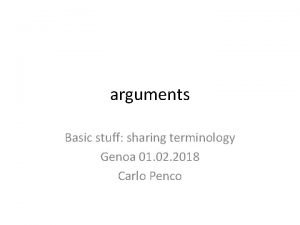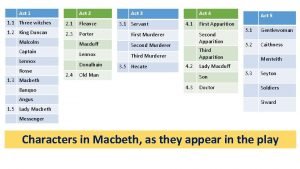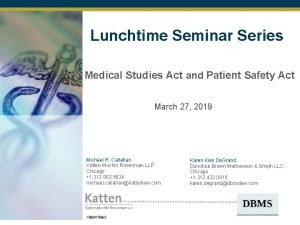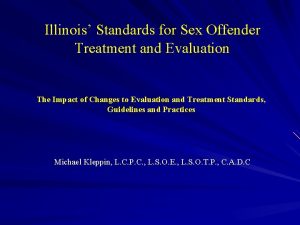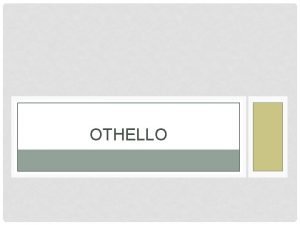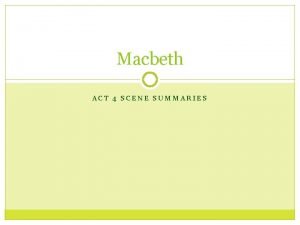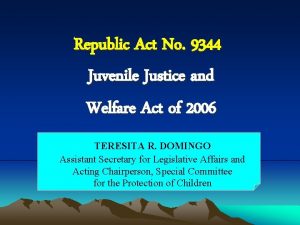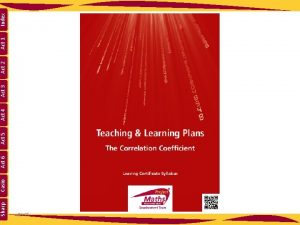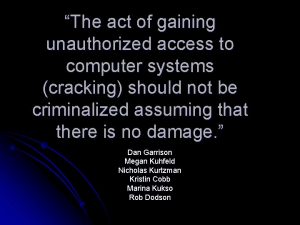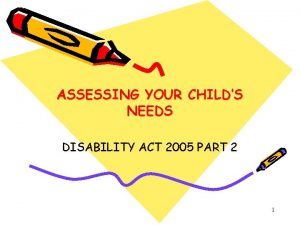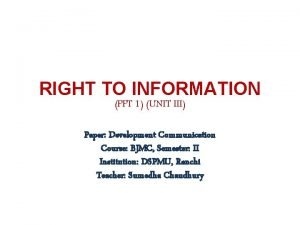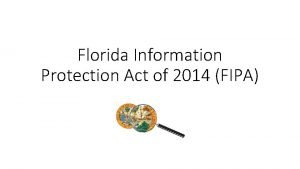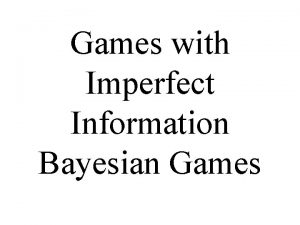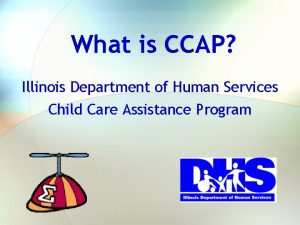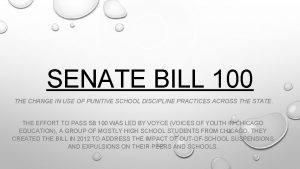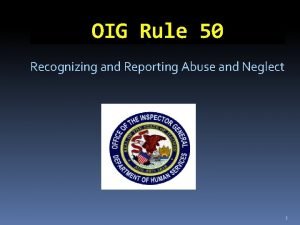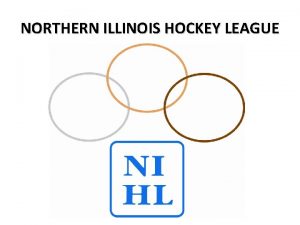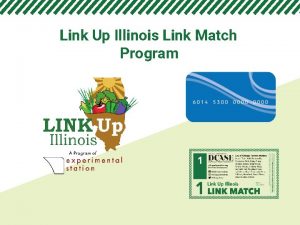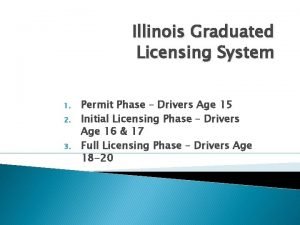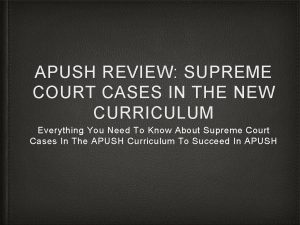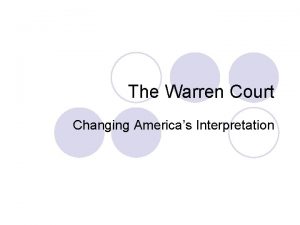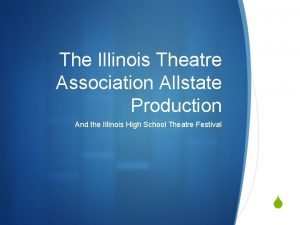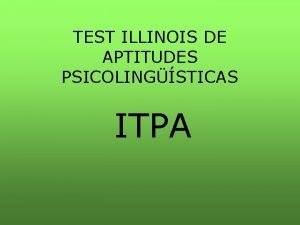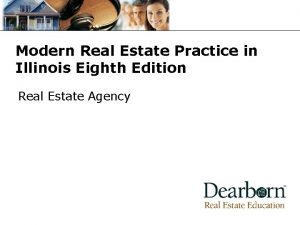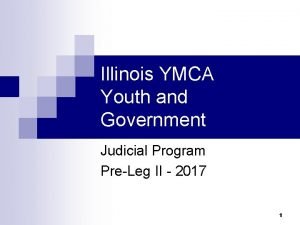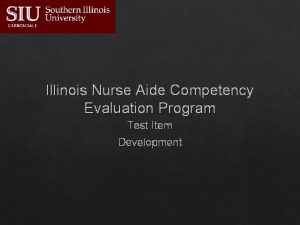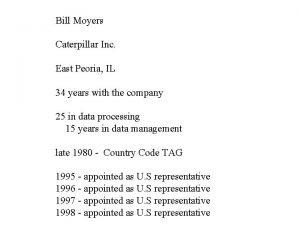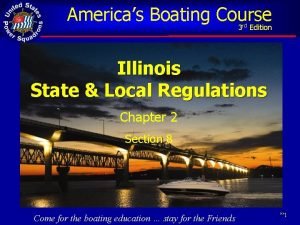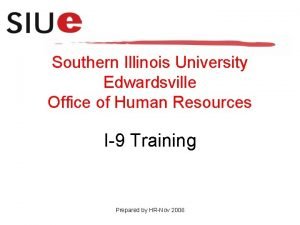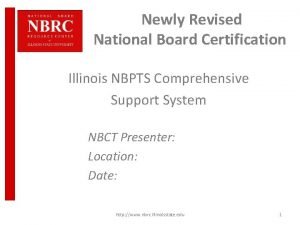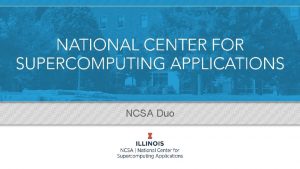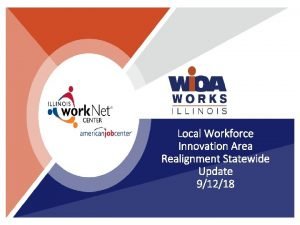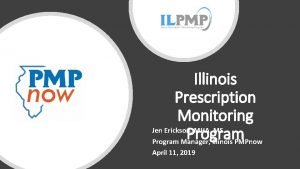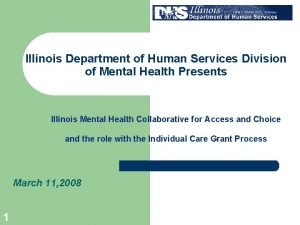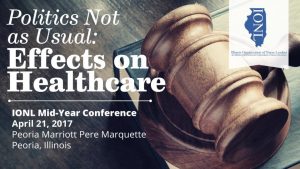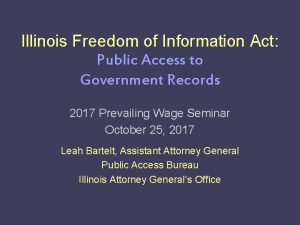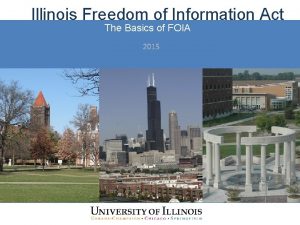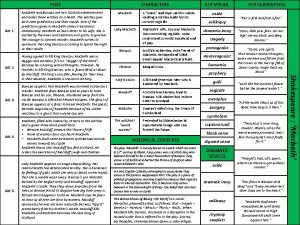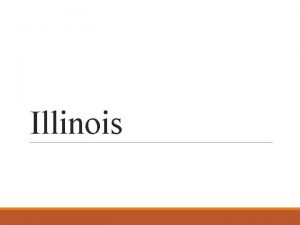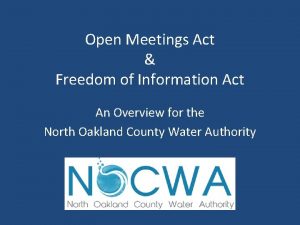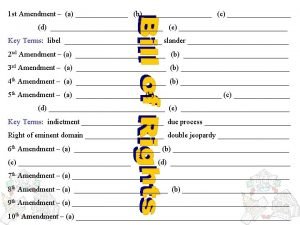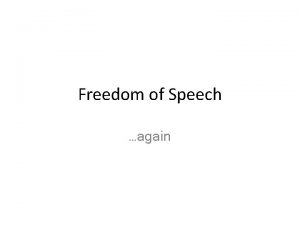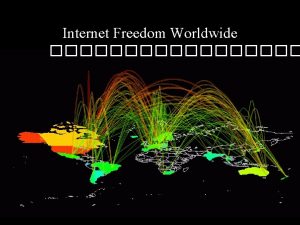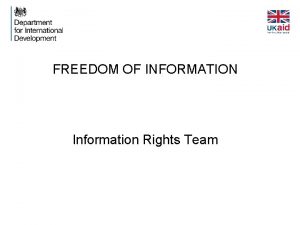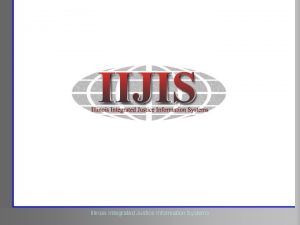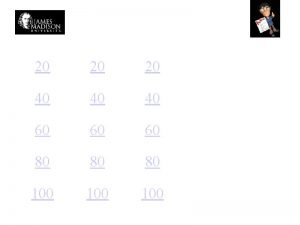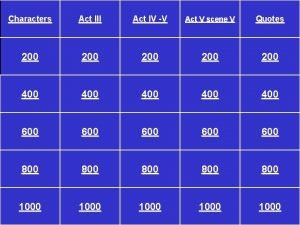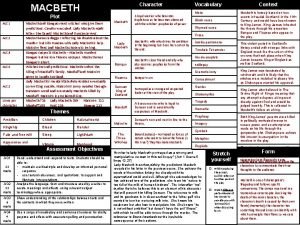Illinois Freedom of Information Act Illinois Freedom of









![FOIA Permits Access to “Public Records” The definition of “public records” includes: “[A]ll * FOIA Permits Access to “Public Records” The definition of “public records” includes: “[A]ll *](https://slidetodoc.com/presentation_image_h/7d444e89170158abafed88b8e1f9338d/image-10.jpg)
























































- Slides: 66

Illinois Freedom of Information Act: Illinois Freedom of Information Act Public Access to Government Records 2017 Prevailing Wage Seminar October 25, 2017 Leah Bartelt, Assistant Attorney General Public Access Bureau Illinois Attorney General’s Office

The PURPOSE of FOIA “The General Assembly hereby declares that it is the public policy of the State of Illinois that access by all persons to public records promotes the transparency and accountability of public bodies at all levels of government. It is a fundamental obligation of government to operate openly and provide public records as expediently and efficiently as possible in compliance with this Act. ” (Emphasis added. ) 5 ILCS 140/1

The Freedom of Information Act (FOIA) (5 ILCS 140/1 et seq. ) originally became effective on July 1, 1984. On January 1, 2010, significant revisions to FOIA were enacted. Major changes include: • Presumption of Openness • Response time shortened from 7 to 5 days • Copying charge limits • FOIA Officers and training required • Creation of Public Access Counselor position

Public Access Counselor • Within the Attorney General’s Office • Primary purpose is to resolve disputes involving potential violations of FOIA and the Open Meetings Act or the Freedom of Information Act in response to requests for review by an aggrieved party, by mediation or otherwise informally resolving the dispute, or by issuing a binding opinion.

Public Access Counselor Statutory Powers Attorney General Act, 15 ILCS 205/7(c) Duties include: FREE TRAINING and EDUCATIONAL MATERIALS; REQUESTS FOR REVIEW; ADVISORY OPINIONS; INFORMAL INQUIRIES; RESEARCH and RECOMMENDATIONS ON COMPLIANCE ISSUES, ESTABLISH ELECTRONIC FOIA and OMA TRAINING

Presumption of Openness Under FOIA, there is a presumption that public records are open to inspection or copying: “Presumption. All records in the custody or possession of a public body are presumed to be open to inspection or copying. Any public body that asserts that a record is exempt from disclosure has the burden of proving by clear and convincing evidence that it is exempt. ” 5 ILCS 140/1. 2

Notice to the Public – Section 4(b) of FOIA Requires each public to display, make available for inspection and copying, and mail if requested: • “A brief description of the methods whereby the public may request information and public records, a directory designating the Freedom of Information officer or officers, the address where requests for public records should be directed, and any fees allowable under Section 6 of this Act. ” If a public body maintains a website, this information must also be posted there!

Additional FOIA Requirements • Each public body must designate one or more FOIA officers; • Must develop list of documents or categories of records for immediate disclosure; 5 ILCS 140/3. 5(a) • All FOIA Officers must successfully complete electronic training curriculum annually. Newly appointed FOIA officers have 30 days to complete the training. 5 ILCS 140/3. 5(b)

Submitting a FOIA Request • • In writing, directed to the Public Body. Oral requests may be honored. Standard form may not be required. Public Body may not require requester to specify a purpose, except to determine whether the request is for a commercial purpose. • Follow the posted directions and direct request to FOIA officer if known See 5 ILCS 140/3(c).
![FOIA Permits Access to Public Records The definition of public records includes All FOIA Permits Access to “Public Records” The definition of “public records” includes: “[A]ll *](https://slidetodoc.com/presentation_image_h/7d444e89170158abafed88b8e1f9338d/image-10.jpg)
FOIA Permits Access to “Public Records” The definition of “public records” includes: “[A]ll * * * documentary materials pertaining to the transaction of public business, regardless of physical form or characteristics, having been prepared by or for, or having been or being used by, received by, in the possession of, possessed or under the control of any public body. ” 5 ILCS 140/2(c).

Records “in possession of … under control” of public body If public officials or government employees exchange correspondence pertaining to the transaction of public business using personal email accounts or personal cell phones, are those emails or texts “public records” of the public body?

Definition of Public Record If public employees sent or received communications via personal e-mail accounts, and those communications pertain to the transaction of public business, then those communications are “public records” subject to the requirements of FOIA. The public body may be able to fulfill its obligations under FOIA by asking the applicable personnel to search their e-mail accounts in good faith. Ill. Att'y Gen. Pub. Acc. Op. No. 16 -006, issued August 9, 2016.

Definition of Public Record A public record must pertain to the transaction of public business. Therefore, any communications relating to strictly personal matters are not “public records” subject to disclosure under FOIA, regardless of how or where they are maintained. Content controls, not the medium.

What is a Public Record? FOIA does not require a public body to create records in order to respond to a FOIA request; rather a public body is required to make records within its possession or control available for inspection and copying. Workmann v. Illinois State Bd. of Educ. , 229 Ill. App. 3 d 459, 464 (2 d Dist. 1992).

Hypothetical A reporter sends a FOIA request to the City requesting the hire and promotion dates of all department employees. The department denied this FOIA request saying that it would have to compile this information from its HR database and FOIA does not require it to create a new document. Does the department's response comply with FOIA?

NO. In Hamer v. Lentz, 132 Ill. 2 d 49, 56 (1989), the Illinois Supreme Court considered whether a public body was required to create a computer program to generate a paper copy of information which it possessed only on computer tape, and concluded that it was required to do so: "In sum, the * * * information is maintained by defendants in the ordinary course of business, is nonexempt, and thus must be disclosed. Disclosure of the information in no way involves the creation of a new record. " Lentz, 132 Ill. 2 d at 57.

What is a Public Record? FOIA does not require public bodies to create entirely new records consisting of information that is not in its possession or custody, but a public body may be required to compile and re-organize information that it already maintains in the ordinary course of business. Hites v. Waubonsee Community College, 2016 IL App (2 d) 150836 (2016).

Explaining Public Records FOIA is not intended to compel public bodies to interpret or advise requesters as to the meaning or significance of the public records. 5 ILCS 140/3. 3

Records of Funds “All records relating to the obligation, receipt, and use of public funds of the State, units of local government, and school districts are public records subject to inspection and copying by the public. ” 5 ILCS 140/2. 5

Payrolls “Certified payrolls submitted to a public body by contractors and subcontractors doing public work under Section 5(a)(2) of the Prevailing Wage Act are public records”; “except that contractors’ employees’ addresses, telephone numbers, and social security numbers must be redacted by the public body prior to disclosure. ” 5 ILCS 140/2. 10

Settlement and Severance Agreements “All settlement or severance agreements entered into by or on behalf of a public body are public records subject to inspection and copying by the public, provided that information exempt from disclosure under Section 7 of this Act may be redacted. ” 5 ILCS 140/2. 20

Record Held by Agent A public record that is not in the possession of a public body but is in the possession of a party with whom the agency has contracted to perform a governmental function on behalf of the public body, and that directly relates to the governmental function and is not otherwise exempt under this Act, shall be considered a public record of the public body, for purposes of this Act. 5 ILCS 140/7(2) (West 2010).

In Summary: “Public records” are documents pertaining to the transaction of public business in the possession of a public body. This includes: • Records in the possession of employees (personal e-mail account) • Records held by agent performing gov’t function • Records describing use/receipt of public funds • Settlement & severance agreements, certified payrolls NOT answers to questions

Responding to a Request -Time A public body must generally respond to a FOIA request within 5 business days after receipt of a written request. The time for response may be extended for an additional 5 business days for one of seven reasons specified in the Act. See 5 ILCS 140/3 (d), (e)

Failure to Respond • Failure to respond to a request within the time permitted is considered a denial of the request. • A public body that fails to timely respond to a request, but then provides copies of the requested public records may not impose a fee for those copies. • A public body that fails to respond to a request received may not treat the request as unduly burdensome under section 3(g). 5 ILCS 140/3(d)

FOIA RESPONSE A FOIA request may be granted, denied, or granted in part and denied in part. If denying a request for public records the public body shall notify the requester in writing of: 1. The decision to deny the request, 2. The reasons for the denial, including a detailed factual basis for the application of any exemption claimed, and 3. The names and titles or positions of each person responsible for the denial.

FOIA Response, cont. In addition, each notice of denial by a public body shall: 1. Inform the requester of his or her right to seek review by the Public Access Counselor, 2. Provide the address and phone number of the Public Access Counselor, 3. Inform the requester of his right to judicial review under section 11 of FOIA. 5 ILCS 140/9(a)

Other possible responses: • Public body may respond that it does not possess records responsive to the request. – Although not technically a denial, this is something that can be reviewed. • Also may deny the request on the basis that it asks the public body to create record or answer a question. • Or record maintained online, or request unduly burdensome.

Records Maintained Online Section 8. 5 of FOIA • Public body is not required to copy a public record that is published on its website; • Public body must notify the requester that the public record is available online and direct the requester to the website. • Persons unable to reasonably access the record online may re-submit the request, public body must then respond as provided in section 3.

Unduly Burdensome • Section 3(g) of FOIA permits a public body to deny a request if compliance would be unduly burdensome. • Before invoking this section, must extend opportunity to reduce the request to manageable proportions. • Is your request unduly burdensome? It depends! Request is unduly burdensome if burden of compliance on public body outweighs public interest in the information. Case by case analysis. • Repeated requests by same person for same records identical to records previously provided or properly denied are unduly burdensome.

Responses that are not denials – “Commercial purpose” “’Commercial purpose’ means the use of any part of a public record or records, or information derived from public records, in any form for sale, resale, or solicitation or advertisement for sales or services. ” 5 ILCS 140/2(c-10) • Response due within 21 business days; • No review by PAC, except commercial purpose designation.

“Recurrent Requester” A person who, in the 12 months immediately preceding the request, has submitted to the same public body: (i) a minimum of 50 requests for records, (ii) a minimum of 15 requests for records within a 30 -day period, (iii) a minimum of 7 requests for records within a 7 -day period. 5 ILCS 140/2(g) News media and non-profit, scientific, or academic organizations are generally excluded.

“Recurrent Requester” Within 5 business days, notification that the request is being treated as one from a recurrent requester. Response in 21 business days.

“Voluminous Request” "Voluminous request" means a request that: (i) includes more than 5 individual requests for more than 5 different categories of records or a combination of individual requests that total requests for more than 5 different categories of records in a period of 20 business days; or (ii) requires the compilation of more than 500 letter or legal-sized pages of public records unless a single requested record exceeds 500 pages. "Single requested record" may include, but is not limited to, one report, form, e-mail, letter, memorandum, book, map, microfilm, tape, or recording. Section 2(h)

“Voluminous Request” "Voluminous request" does not include a request made by news media and non-profit, scientific, or academic organizations if the principal purpose of the request is: (1) to access and disseminate information concerning news and current or passing events; (2) for articles of opinion or features of interest to the public; or (3) for the purpose of academic, scientific, or public research or education. • Must give opportunity to narrow/reduce

Copying Fees • Up to 15 cents per page for black and white, letter or legal sized copies. • First 50 pages free of black and white, letter or legal sized copies. • If a public body provides copies in color or in a size other than letter or legal, the public body may charge its actual cost for reproducing the records. Except when a fee is otherwise fixed by statute (e. g. , crash reports, coroner’s reports) 5 ILCS 140/6(b)

Fees for Electronic Copies A public body may only charge the requester for the actual cost of purchasing the recording medium, whether disc, diskette, tape, or other medium. Except to the extent the General Assembly expressly provides, statutory fees applicable to copies of public records when furnished in a paper format shall not be applicable to those records when furnished in an electronic format. 5 ILCS 140/6(a)

Voluminous Electronic Fees Records not in PDF: 2 megabytes: 2 -4 megabytes: 4+ megabytes: PDF Records: 80 megabytes: 80 -160 megabytes: 160+ megabytes Up to $20 Up to $40 Up to $100

Primary Reasons for Denials or Partial Denials – Information Exempt from FOIA Disclosure To enable public bodies to maintain certain types of sensitive public records confidentially, FOIA provides a number of exceptions to the requirement that public records be made available for public inspection. The exemptions do not, however, prohibit the dissemination of information; rather, they merely authorize the withholding of information. Roehrborn v. Lambert, 277 Ill. App. 3 d 181, 186 (1 st Dist. 1995), appeal denied, 166 Ill. 2 d 554.

General Categories of Exemptions 1) 2) 3) 4) 5) 6) Personal Privacy Law Enforcement and Security Educational Matters Legal Proceedings Internal Operations Business and Finance The exemptions to disclosure under FOIA are to be narrowly construed. Lieber v. Board of Trustees of Southern Illinois University, 176 Ill. 2 d 401, 408 (1997).

Exemptions, cont. When public records contain information that is exempt from disclosure under section 7, but also contains information that is not exempt from disclosure, the public body may elect to redact exempt information; remaining information shall be made available for inspection and copying. 5 ILCS 140/7(1)

Presumption of Openness Under FOIA, there is a presumption that public records are open to inspection or copying: “Presumption. All records in the custody or possession of a public body are presumed to be open to inspection or copying. Any public body that asserts that a record is exempt from disclosure has the burden of proving by clear and convincing evidence that it is exempt. ” 5 ILCS 140/1. 2

Information Exempt Under Other Laws Section 7(1)(a) of FOIA exempts from disclosure: “Information specifically prohibited from disclosure by federal or State law or rules and regulations implementing federal or State law. ” 5 ILCS 140/7(1)(a)

Information Exempt Under Other Laws – Section 7(1)(a) applies only when a law or rule implementing a law specifically prohibits the public body from releasing the information in question. Better Government Ass’n v. Blagojevich, 899 N. E. 2 d 382, 389 (4 th Dist. 2008).

Information Exempt Under Other Laws Section 7. 5 of FOIA also exempts information that is exempt under other laws. Section 7. 5, however, specifically references statutory exemptions. Sections 7. 5(a) through 7. 5(z) list specific statutes. Examples: 7. 5(q) The Personnel Record Review Act. (Exempts evaluations of employees) 7. 5(r) -The Illinois School Student Records Act (Exempts individually identifiable student records, parent/teacher communications)

Private Information – Section 7(1)(b) “Private information” is exempt from disclosure unless disclosure is required by another provision of the Freedom of Information Act, a State or federal law or a court order.

Private Information Unique identifiers, including: Social Security Numbers Driver's License Number s Employee Identification Number s Biometric Identifiers, Personal Financial Information Passwords or Other Access Codes Medical Records Home or Personal Telephone Numbers Personal Email Addresses 5 ILCS 140/2(c-5)

Personal Information – Section 7(1)(c) of FOIA exempts “Personal information contained within public records, the disclosure of which would constitute a clearly unwarranted invasion of personal privacy, unless the disclosure is consented to in writing by the individual subjects of the information[. ]”

Personal Information, cont. ”Unwarranted invasion of personal privacy” means the disclosure of information that is § Highly personal or objectionable to a reasonable person, and in which the § Subject's right to privacy outweighs any legitimate public interest in obtaining the information.

Personal Information “The disclosure of information that bears on the public duties of public employees and officials shall not be considered an invasion of personal privacy. ” 5 ILCS 140/7(1)(c)

Information found exemption under section 7(1)(c) • Crime victim names • Information related to unsuccessful candidates for employment • Names of suspects who were not arrested (in some cases, incident reports may be withheld in full. e. g. , domestic battery reports. ) • Dates of birth

Information Not Exempt under Section 7(1)(c) • Resumes, CV, certificates and other employment information • Places of employment, outside employment • Dollar amount deducted from all employee paychecks for union dues

Information Not Exempt under Section 7(1)(c) • Time sheets, vacation time, accrual sheets, and amount of sick days used • Academic transcripts (if courses were taken pursuant to tuition reimbursement)

Deliberative Process/Preliminary Documents – Section 7(1)(f) “Preliminary drafts, notes, recommendations, memoranda and other records in which opinions are expressed, or policies or actions are formulated, except that a specific record or relevant portion of a record shall not be exempt when the record is publicly cited and identified by the head of the public body. ” 5 ILCS 140/7(1)(f)

Deliberative Process/Preliminary Documents The purpose of the deliberative process privilege is to allow agencies to “explore possibilities, engage in internal debates, or play devil's advocate without fear of public scrutiny. ” Assembly of the State of California v. United States Department of Commerce, 797 F. Supp. 1554, 1556 E. D. Cal. 1992), aff'd, 968 F. 2 d 916 (9 th Cir. 1992).

Deliberative Process/Preliminary Documents • Portions of police reports setting forth factual data are not within the deliberative process exemption. See Matter of Gould v. New York City Police Dep’t, 89 N. Y. 2 d 267, 277; 675 N. E. 2 d 808, 813 (1996) • Statistical Data is not exempt from disclosure under section 7(1)(f). See Ill. Att’y Gen. Pub. Acc. Op. No. 13 -015, issued September 24, 2013

Trade Secrets – Section 7(1)(g) Trade secrets and commercial or financial information obtained from a person or business are exempt pursuant to section 7(1)(g) if provided to the public body under a claim of confidentiality • But only if disclosure of the information would cause competitive harm

Pre-Award Proposals and Bids – Section 7(1)(h) Proposals and bids for any contract, grant, or agreement are exempt pursuant to section 7(1)(h) • If disclosure would frustrate procurement or give an advantage to any person proposing to enter into a contractor agreement • Only until an award or final selection is made

Privileged Information – Section 7(1)(m) Communications between a public body and an attorney or auditor representing the public body that would not be subject to discovery in litigation, or are prepared in anticipation of litigation, are exempt from disclosure under section 7(1)(m) of FOIA.

Attorney/Client Communication Section 7(1)(m) does not exempt from disclosure generic descriptions of tasks an attorney performed contained in invoices, such as “read e-mail, " “telephone conference, ” and “court appearance. " A public body may redact only information that could reveal legal advice provided or a substantive communication between an attorney and a representative of the public body. Ill. Att'y Gen. Pub. Acc. Op. No. 12 -005, issued March 12, 2012.

Attorney-Client Communication Entries on calendar reflecting meetings with attorneys not exempt under section 7(1)(m) of FOIA Disclosing the identities of people a public official met with would not necessarily reveal confidential attorney-client communications Binding Opinion 15 -008

Other Statutory Exemptions In addition to the exemptions previously noted, statutory exemptions referring to other statutes have been consolidated in section 7. 5 Examples: • • Information exempted under the Personnel Records Review Act; Information exempted under the State Officials and Employees Ethics Act. 5 ILCS 140/7. 5

Remedies if your FOIA request is denied (1)Request for Review with PAC “A person whose request to inspect or copy a public record is denied by a public body, except the General Assembly and committees, commissions, and agencies thereof, may file a request for review with the Public Access Counselor [. ]” 5 ILCS 140/9. 5

Remedies if your FOIA request is denied (2) Judicial Review Any person denied access to inspect or copy any public record by a public body may file suit for injunctive or declaratory relief. 5 ILCS 140/11(a) If the requester files suit under section 11 * * * the Public Access Counselor shall take no further action with respect to the request for review and shall so notify the public body. 5 ILCS 140/9. 5(g)


Contact Information Office of the Attorney General Public Access Bureau 500 South Second Street Springfield, IL 62706 FOIA Hotline: 877 -299 -3642 publicaccess@atg. state. il. us
 Positive freedom negative freedom
Positive freedom negative freedom Glorious freedom wonderful freedom
Glorious freedom wonderful freedom Macbeth summary
Macbeth summary Illinois healthcare lien act
Illinois healthcare lien act Medical studies act
Medical studies act Sex offender evaluation illinois
Sex offender evaluation illinois Othello first act summary
Othello first act summary What is the role of modifiers of human acts
What is the role of modifiers of human acts Macbeth act 1 synopsis
Macbeth act 1 synopsis Indirect voluntariness examples
Indirect voluntariness examples Republic act no. 9344
Republic act no. 9344 Title act interior design
Title act interior design Act 120 certification
Act 120 certification S a t c quadrants
S a t c quadrants Act 6 act 5
Act 6 act 5 Act 6 act 3
Act 6 act 3 The act of gaining unauthorized access to a computer system
The act of gaining unauthorized access to a computer system Disability act 2005 citizens information
Disability act 2005 citizens information Rti act ppt
Rti act ppt Florida information protection act of 2014
Florida information protection act of 2014 Incomplete vs imperfect information
Incomplete vs imperfect information Ccr&r illinois calculator
Ccr&r illinois calculator Mdch champs
Mdch champs Illinois senate bill 100
Illinois senate bill 100 Illinois polst
Illinois polst Disaster acrostic
Disaster acrostic Rule 50 illinois
Rule 50 illinois Northern illinois hockey league
Northern illinois hockey league Issue il trp
Issue il trp Escobedo v illinois
Escobedo v illinois Link match illinois
Link match illinois Illinois graduated drivers license
Illinois graduated drivers license Obra screening illinois
Obra screening illinois Illinois crop improvement association
Illinois crop improvement association Ibla illinois lacrosse
Ibla illinois lacrosse Chicago, illinois (latitude 42°n) is located in the
Chicago, illinois (latitude 42°n) is located in the Illinois digital preservation
Illinois digital preservation Important court cases apush
Important court cases apush Gideon vs wainwright oyez
Gideon vs wainwright oyez Illinois theatre association
Illinois theatre association Itpa test illinois de aptitudes psicolingüísticas
Itpa test illinois de aptitudes psicolingüísticas Kawneer 5500
Kawneer 5500 Modern real estate practice in illinois
Modern real estate practice in illinois Illinois ymca youth and government
Illinois ymca youth and government Illinois nurse aide testing
Illinois nurse aide testing Illinois height modernization
Illinois height modernization Illinois early learning guidelines
Illinois early learning guidelines Illinois department of rehabilitation
Illinois department of rehabilitation Illinois assistive technology
Illinois assistive technology Famous people from illinois
Famous people from illinois Abe illinois
Abe illinois Papercut print scripting
Papercut print scripting Bright directions 529
Bright directions 529 Caterpillar east peoria il
Caterpillar east peoria il Illinois boat education
Illinois boat education Illinois bituminous paving conference
Illinois bituminous paving conference Southern illinois university human resources
Southern illinois university human resources Wabash v illinois
Wabash v illinois National board certification illinois
National board certification illinois Uiuc duo mobile
Uiuc duo mobile Illinois lwia map
Illinois lwia map Ilpmp
Ilpmp Illinois prairie flowers
Illinois prairie flowers Illinois height modernization
Illinois height modernization Illinois department of human services
Illinois department of human services Recovery coach training illinois
Recovery coach training illinois Nclex processing
Nclex processing
